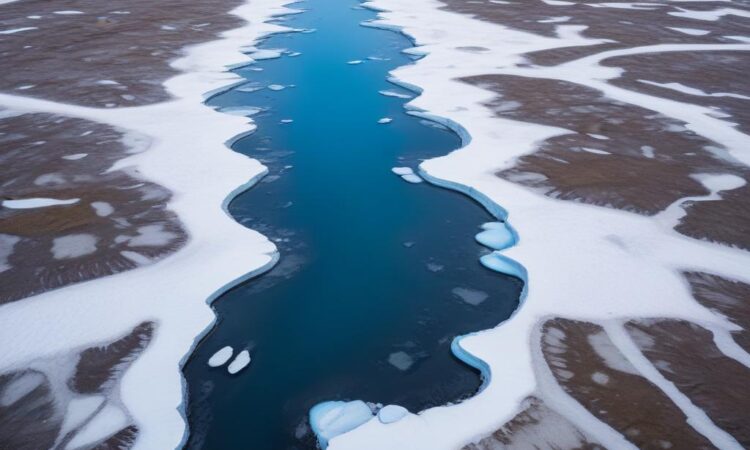Climate Change Impacts Exacerbated by Unexpected Feedback Loop
New research reveals a previously unknown feedback loop in the Arctic significantly accelerating the melting of permafrost and contributing to more rapid sea-level rise. This has significant implications for coastal communities and global weather patterns. The implications of this discovery are far-reaching and demand immediate attention from policymakers and the global community.
The Arctic, often referred to as the “world’s refrigerator,” plays a crucial role in regulating global temperatures. The vast expanse of permafrost, permanently frozen ground, stores enormous quantities of organic carbon – a byproduct of decaying plant and animal matter accumulated over millennia. This stored carbon, when thawed, releases potent greenhouse gases, primarily methane and carbon dioxide, into the atmosphere. These gases are significantly more powerful than carbon dioxide at trapping heat, creating a vicious cycle of warming and further thawing.
The newly discovered feedback loop involves a complex interaction between thawing permafrost, changes in Arctic hydrology, and altered vegetation patterns. Previous models of climate change have largely underestimated the impact of this intricate process. The research, published in [Insert Journal Name Here], utilizes advanced satellite imagery, ground-based measurements, and sophisticated climate modeling to paint a clearer picture of this accelerating phenomenon.
One key aspect of the feedback loop is the increased release of methane from thawing permafrost. Methane is a far more potent greenhouse gas than carbon dioxide, meaning even relatively small releases can have a disproportionately large impact on global warming. The research indicates that the rate of methane release is accelerating, significantly exceeding previous predictions. This unexpected surge in methane emissions is contributing to a faster rate of warming in the Arctic, leading to a self-reinforcing cycle.
The consequences of this accelerated permafrost thaw extend far beyond the Arctic. The increased release of greenhouse gases contributes to global warming, intensifying extreme weather events such as heatwaves, droughts, and floods across the globe. Rising sea levels, a direct consequence of melting permafrost and glacial ice, pose a serious threat to coastal communities, displacing millions and causing significant economic damage.
The melting permafrost also destabilizes the Arctic landscape, increasing the risk of landslides and ground subsidence. This has implications for infrastructure, including pipelines and buildings, located in permafrost regions. The changing landscape also affects the habitats of numerous Arctic species, disrupting ecosystems and potentially leading to biodiversity loss.
Scientists are now racing to better understand the intricacies of this newly discovered feedback loop and to develop strategies to mitigate its effects. This involves improving climate models to incorporate the latest findings, developing innovative technologies to capture methane emissions, and implementing policies to reduce greenhouse gas emissions globally. International collaboration and concerted efforts are essential to addressing this pressing challenge.
The implications for coastal communities are particularly concerning. Rising sea levels pose an existential threat to low-lying islands and coastal cities, leading to displacement, economic hardship, and increased vulnerability to extreme weather events. Adaptation strategies, such as building seawalls and relocating communities, are crucial but may not be sufficient to cope with the accelerated rate of sea-level rise.
The research highlights the urgent need for immediate and decisive action to address climate change. Reducing greenhouse gas emissions is paramount to slowing down the rate of permafrost thaw and mitigating its devastating consequences. Investing in renewable energy sources, improving energy efficiency, and promoting sustainable land management practices are crucial steps towards a more sustainable future.
Furthermore, the study emphasizes the importance of continued research and monitoring of the Arctic region. Understanding the complex interactions within the Arctic ecosystem is crucial for developing accurate climate models and implementing effective mitigation and adaptation strategies. A concerted global effort is needed to address this urgent challenge before the consequences become irreversible.
The findings underscore the interconnectedness of Earth’s systems and the profound implications of climate change. The previously unknown feedback loop serves as a stark reminder of the complexity of the climate system and the need for proactive and collaborative action to safeguard the planet’s future. The acceleration of permafrost thaw highlights the urgency of transitioning to a low-carbon economy and embracing sustainable practices across all sectors.
The research also emphasizes the critical importance of international cooperation in addressing climate change. The challenge requires a global response, with nations working together to reduce greenhouse gas emissions, develop adaptation strategies, and share knowledge and resources. Only through collective action can we hope to mitigate the devastating impacts of climate change and build a more resilient future.
This discovery underscores the need for ongoing research into the Arctic’s complex climate dynamics and the development of more accurate predictive models. Improved understanding of these processes is vital for informed decision-making and the implementation of effective policies to protect vulnerable communities and ecosystems.
The urgency of the situation cannot be overstated. The accelerated melting of permafrost represents a significant threat to global stability and human well-being. Immediate and decisive action is required to mitigate the impacts of this devastating feedback loop and protect our planet for future generations.
The findings of this research should serve as a wake-up call for policymakers and the global community. The time for inaction is over. We must act now to address climate change and protect our planet before it is too late.

